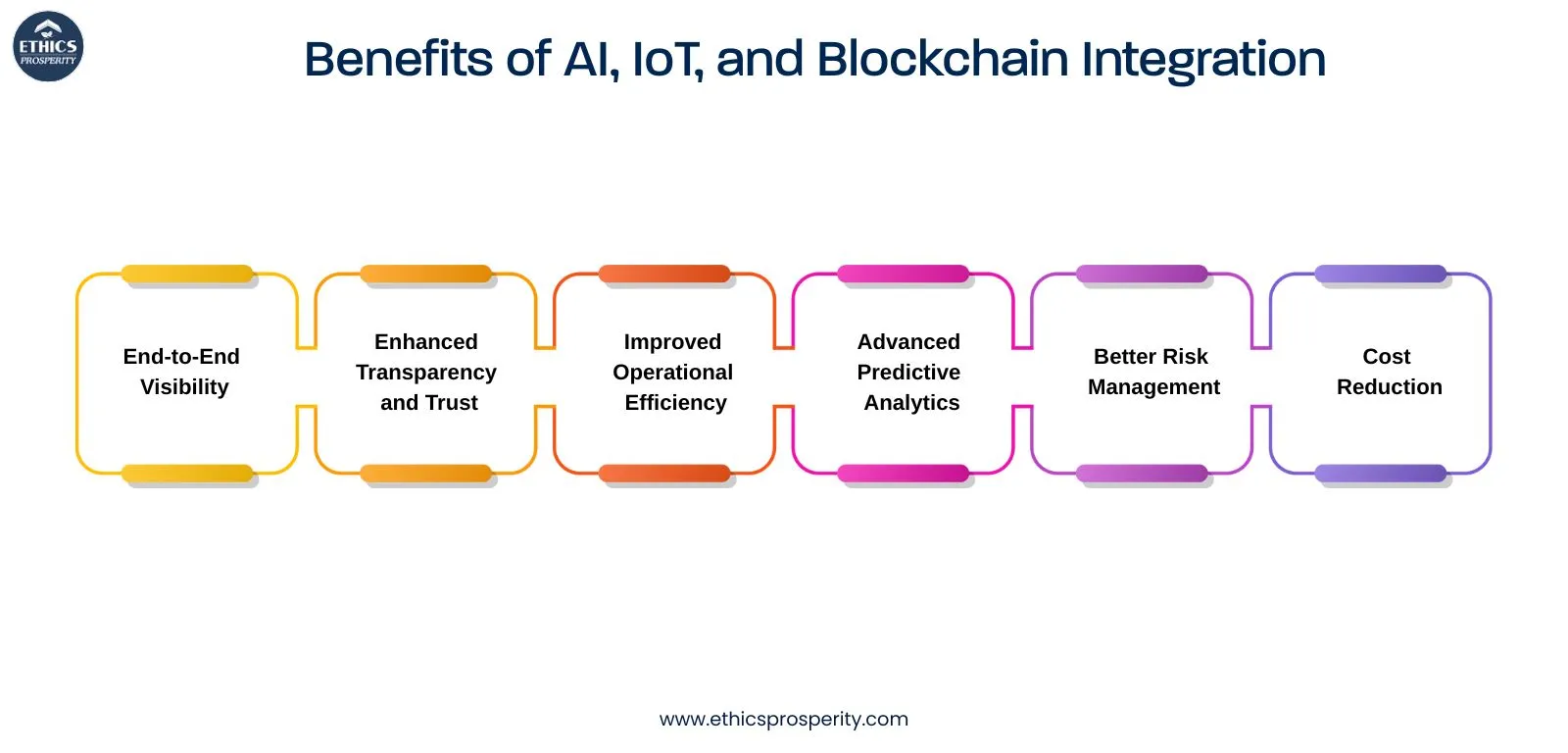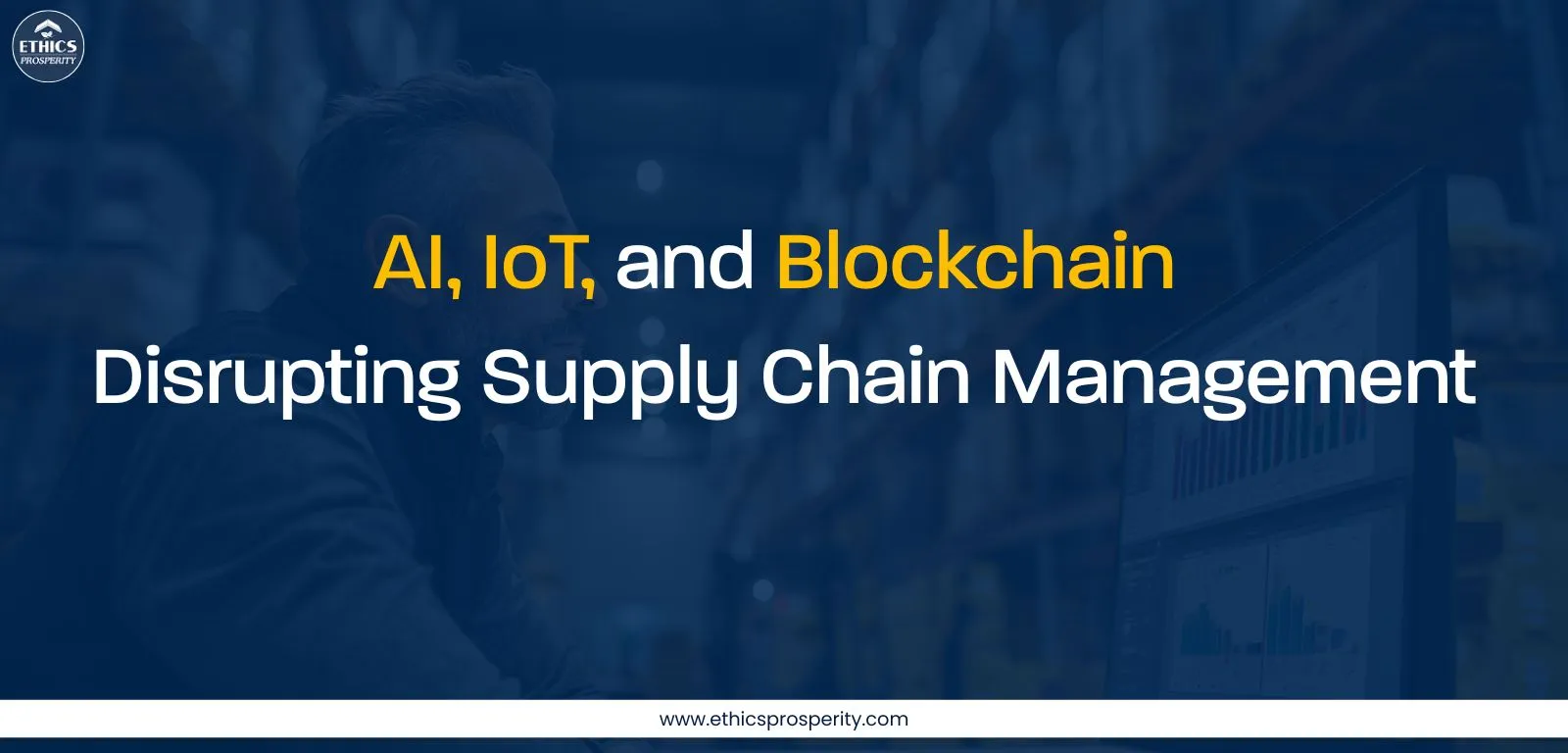One of the fastest-growing technology frontiers in the automotive industry is the rise of autonomous and connected vehicle technologies. While “autonomous” has long been linked with self-driving cars, it’s now making its way into the supply chain, reshaping how goods move and operations function. In recent years, the supply chain has been transformed by a wave of disruptive innovations like AI, IoT, and blockchain that are redefining efficiency, visibility, and intelligence across the entire network.
Many experts and technology providers often examine these innovations separately in the context of supply chains. But the true power emerges when these technologies are integrated. Although “autonomous” is typically linked with AI, from a supply chain perspective, the real breakthrough comes from combining AI, IoT, and blockchain. Together, they create a supply chain ecosystem that is significantly more intelligent, connected, and trustworthy in its overall functioning.
Role of AI in Supply Chain Management
Artificial intelligence (AI) plays a pivotal role in end to end supply chain management by leveraging sophisticated algorithms and advanced data analytics to optimize processes, strengthen decision-making, and enhance operational efficiency.
AI’s Key Roles in Supply Chain Management are as follow:
-
Accurate Demand Forecasting: Predicts future demand using data trends to reduce stockouts and excess inventory.
-
Inventory Optimization: Automates reorder points and safety stock levels for cost-efficient inventory control.
-
Predictive Maintenance: Identifies equipment failures in advance to minimize downtime and improve productivity.
-
Warehouse Automation: Supports robots and smart systems for faster picking, packing, and sorting.
-
Real-Time Supply Chain Visibility: Provides instant updates on product movement and operational status.
-
AI-Driven Quality Control: Uses computer vision to detect defects and maintain product quality.
-
Fraud & Anomaly Detection: Spots irregular transactions or shipment issues to prevent loss.
Role of IoT in Supply Chain Management
The Internet of Things (IoT) significantly enhances supply chain management by linking physical assets such as equipment, vehicles, sensors, and products to digital platforms. This interconnected network enables continuous data capture, real-time monitoring, and greater automation throughout all phases of the supply chain.
Key Role of IoT in Supply Chain Management are as follow:
-
Real-Time Asset Tracking: IoT sensors monitor the exact location and movement of goods throughout the supply chain.
-
Enhanced Inventory Visibility: RFID tags and smart shelves automatically update stock levels and item movements.
-
Optimized Transportation & Routing: GPS-enabled IoT devices support route optimization and real-time delivery updates.
-
Smart Warehouse Operations: Automated systems enable faster picking, sorting, and replenishment of inventory.
-
Increased Supply Chain Transparency: Continuous data flow enhances visibility and supports faster, data-driven decisions.
-
Stronger Customer Service: Real-time tracking information ensures accurate delivery updates for customers
Role of Blockchain in Supply Chain Management
Blockchain technology significantly enhances supply chain management by using a decentralized, tamper-proof ledger to securely record transactions and monitor the flow of goods and assets across the supply chain.
Key Roles of Blockchain in Supply Chain Management are as follow:
-
Enhanced Transparency: Provides a shared, tamper-proof ledger visible to all authorized stakeholders.
-
Improved Traceability: Tracks every product’s journey from origin to delivery with immutable records.
-
Data Security: Protects supply chain information through encrypted, decentralized data storage.
-
Streamlined Transactions: Automates processes using smart contracts, reducing delays and manual intervention.
-
Better Compliance & Auditing: Ensures accurate records for regulatory checks and quality assurance.
-
Trust Building: Creates a reliable, verifiable system that strengthens collaboration between partners.
Benefits of AI, IoT, and Blockchain Integration

The integration of Artificial Intelligence (AI), the Internet of Things (IoT), and blockchain technologies within supply chain management constitutes a sophisticated, synergistic architecture that enables comprehensive end-to-end visibility, significantly reinforces transparency and trust across all stakeholder interactions, enhances the overall efficiency and reliability of operational processes, and facilitates the generation of advanced predictive analytics to support strategic and data-driven decision-making.
Key benefits of this integration includes:
1. End-to-End Visibility:
-
Real-time tracking of products, assets, and inventory through IoT sensors.
-
Unified, accurate data streams for monitoring supply chain performance.
2. Enhanced Transparency and Trust:
-
Blockchain provides tamper-proof records, reducing fraud and improving compliance.
-
Strengthens accountability among suppliers, manufacturers, and logistics partners.
3. Improved Operational Efficiency:
-
AI-driven automation streamlines planning, scheduling, and workflows.
-
IoT-enabled monitoring reduces delays, disruptions, and manual checks.
4. Advanced Predictive Analytics:
-
AI analyzes large datasets to forecast demand, predict delays, and optimize inventory.
-
Supports proactive rather than reactive decision-making.
5. Better Risk Management:
-
Predictive algorithms identify potential disruptions early.
-
Blockchain supports secure documentation for audits and traceability.
6. Cost Reduction:
-
Optimized routes, reduced waste, and improved resource utilization through AI and IoT.
-
Fewer errors and disputes due to blockchain-based record accuracy.
Challenges in Adopting Emerging Technologies
The incorporation of Artificial Intelligence (AI), the Internet of Things (IoT), and blockchain in supply chain management entails a series of substantive challenges encompassing technical, financial, and organizational spheres.
Some major challenges in adopting emerging technologies are:
-
High Implementation Costs: Significant investment required for hardware, software, and integration.
-
Lack of Skilled Workforce: Shortage of talent capable of managing advanced digital systems.
-
Data Security & Privacy Risks: Increased exposure to cyber threats and data breaches.
-
Organizational Resistance: Employees and management may resist change or automation.
-
High Maintenance & Upgradation Needs: Continuous updates and support are required.
-
Uncertain ROI: Businesses may struggle to measure or justify the return on digital investments.
-
Limited Infrastructure: Inadequate network, connectivity, and digital readiness in some regions.
Smart logistics solutions to address these challenges are as follows:
-
Cloud-based systems to reduce implementation costs
-
Digital training programs to address skill gaps
-
Blockchain and AI cybersecurity for secure data management
-
Change management strategies to reduce resistance
-
Predictive maintenance systems to reduce downtime
-
Real-time analytics dashboards to track ROI
-
IoT-enabled remote monitoring for low-infrastructure areas
The Future of Supply Chain Management with AI, IoT, and Blockchain
The future of supply chain management is poised to be profoundly transformed by the integrated application of Artificial Intelligence (AI), the Internet of Things (IoT), and Blockchain technologies. AI will enable advanced predictive analytics, autonomous decision-making, and process optimisation, enhancing efficiency and responsiveness across all operational stages. IoT will provide continuous real-time visibility through interconnected sensors and smart devices, improving traceability, asset management, and condition monitoring throughout the supply chain network. Meanwhile, Blockchain will strengthen data security, transparency, and trust by creating immutable, tamper-proof records and facilitating automated transactions through smart contracts.
Thus, together, these technologies will establish a highly interconnected, intelligent, and resilient supply chain ecosystem capable of self-optimisation, rapid adaptation to disruptions, and superior coordination among stakeholders. This convergence represents a pivotal shift toward more sustainable, efficient, and trustworthy supply chain practices in the global marketplace.
Conclusion
Digital transformation is reshaping supply chain management by enhancing efficiency, resilience, transparency, and sustainability. Technologies such as IoT, AI, blockchain, and advanced analytics enable real-time visibility, stronger collaboration, and data-driven decision-making. However, challenges persist, including financial limitations, skill gaps, organizational resistance, and concerns over cybersecurity and data privacy. To fully benefit from digital transformation, companies must address these barriers and develop effective strategies for integrating emerging technologies. Future research should further examine long-term impacts on sustainability, ethical practices, and the evolving role of AI and automation in the workforce. By doing so, organizations can build more adaptable, efficient, and sustainable supply chains in an increasingly complex global environment.
Future-ready organizations like Ethics Prosperity are integrating AI, IoT and Blockchain into their supply chain frameworks to build smarter, connected, and sustainability-driven operational systems.
